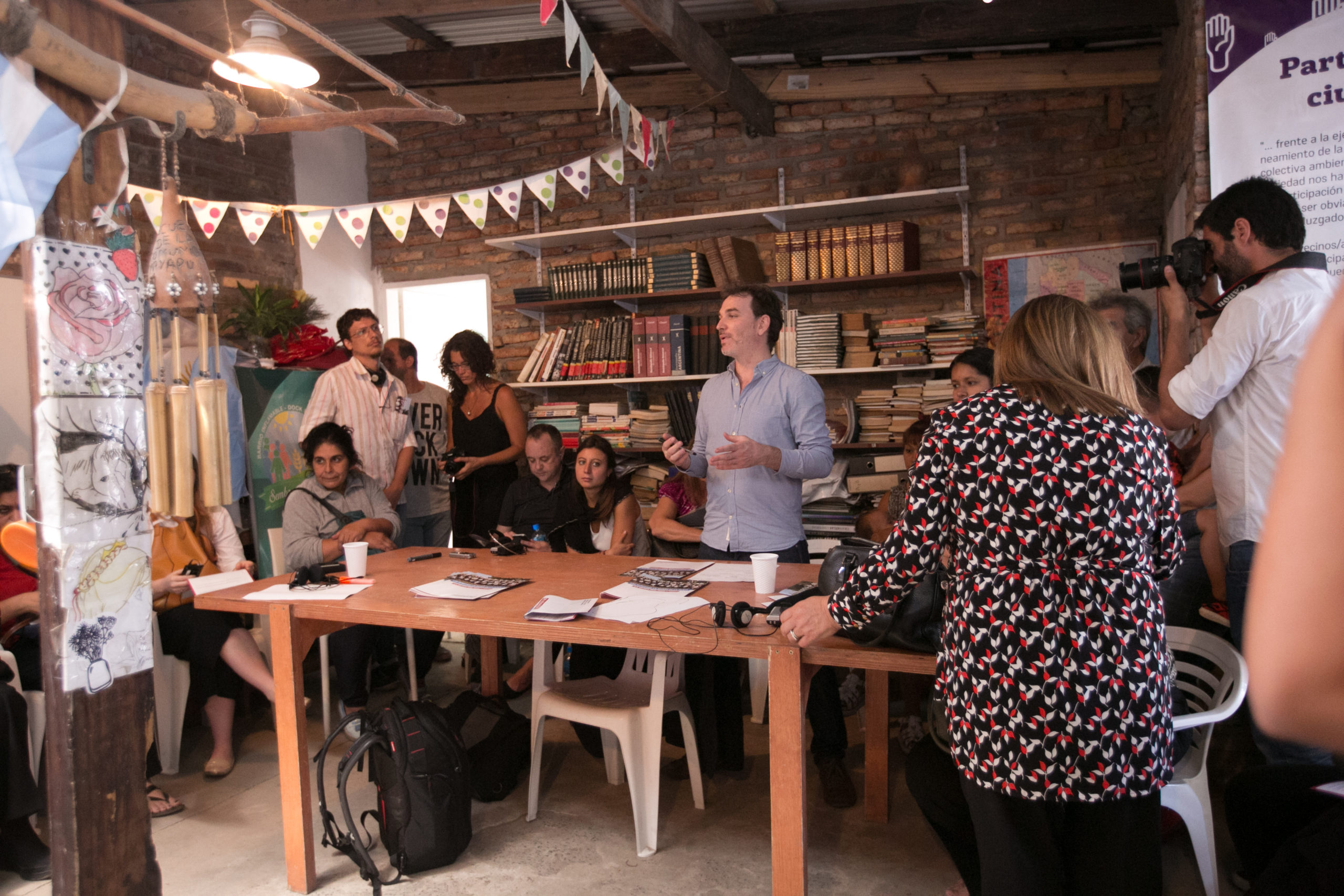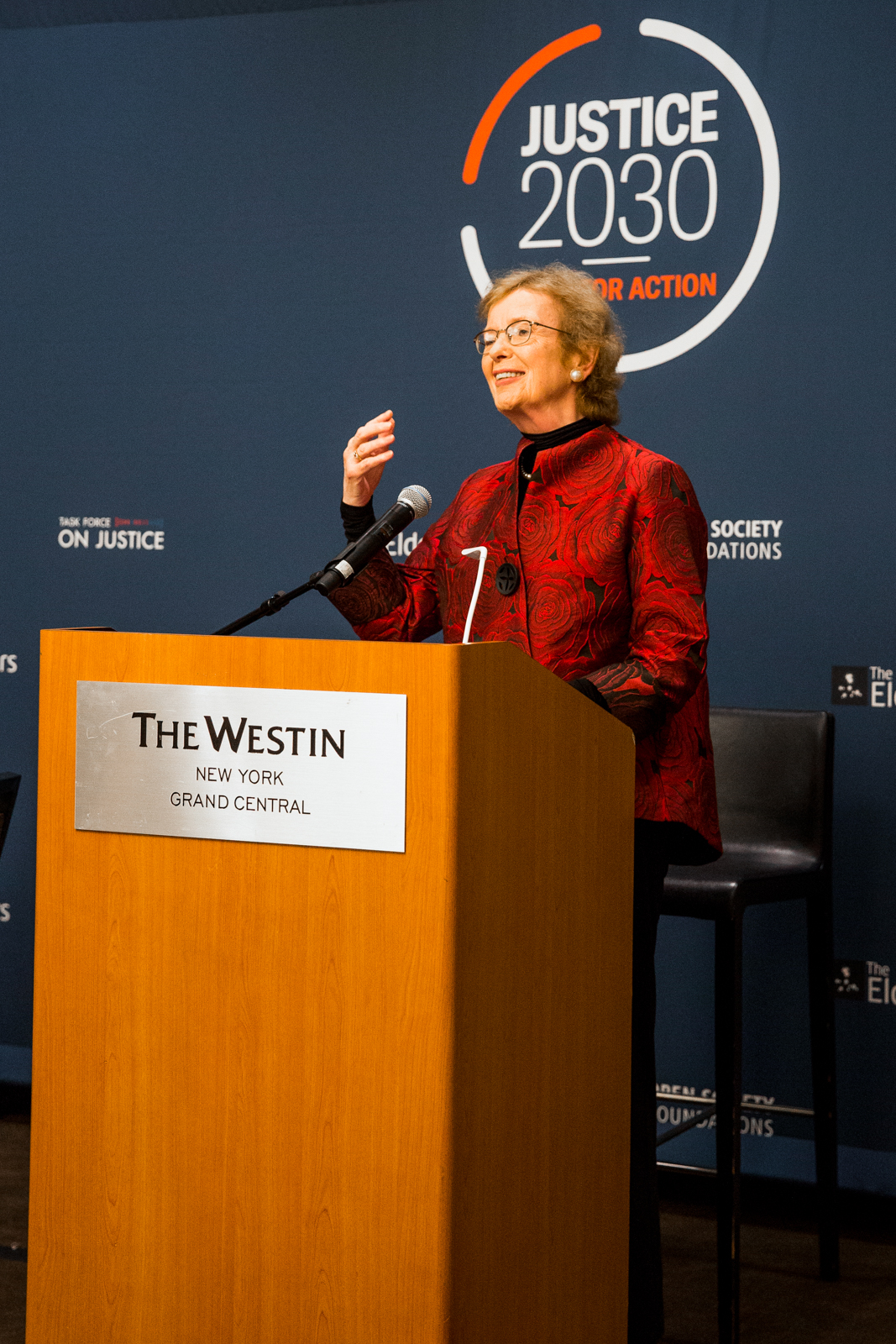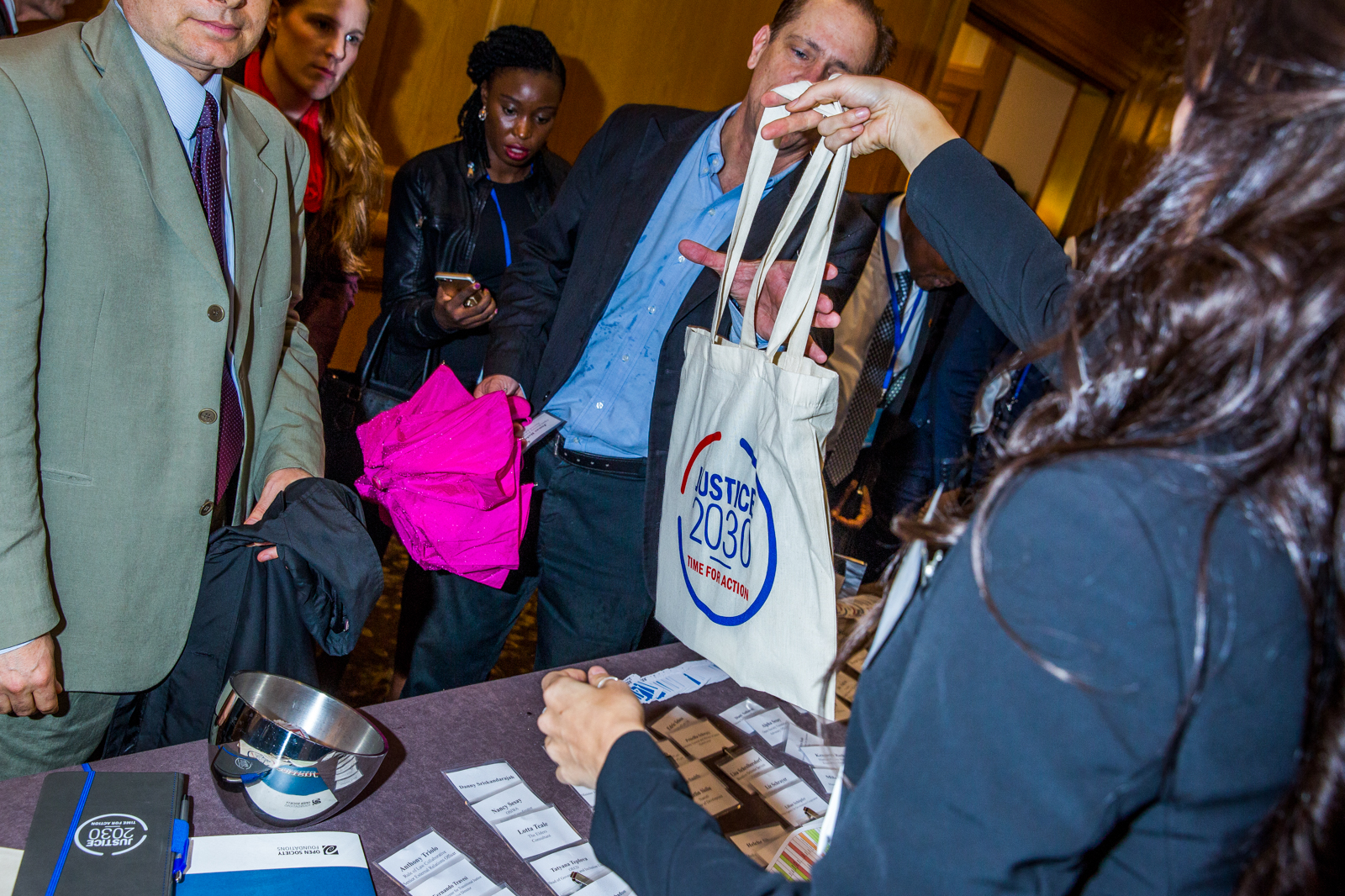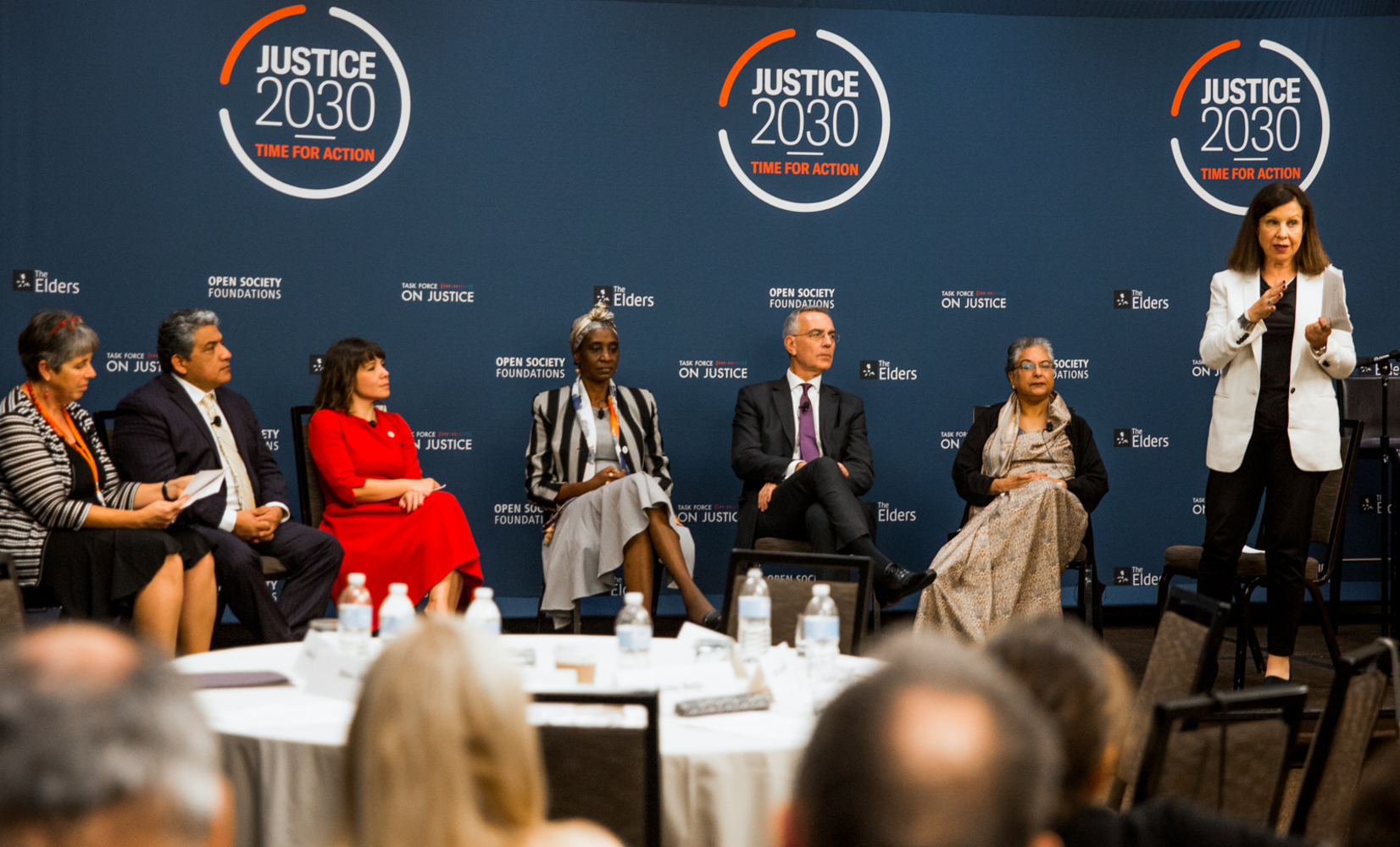Once we had a critical quorum of coalition partners, we turned our focus from building membership to collective influence and actions by members. In total, 180 organizations in over 30 countries took part in campaign actions. 15 countries passed new laws and policies that supported grassroots justice defenders. The Justice For All campaign contributed to shifts in global norms and discourse on justice by fostering a stronger recognition of legal empowerment and grassroots justice defenders as central to the delivery of access to justice for all.
Reports and Political Declarations

Our policy briefs were co-authored with a number of network members. Collectively, we gathered evidence and data on the impact of legal empowerment and the scale of the global justice gap, and showed decision-makers how investing and protecting grassroots justice defenders would help achieve wider social, economic, and environmental goals. We created toolkits to aid their dissemination, including social media graphics and accompanying text. These resources offered Network members a ready-made package of information, evidence, and messaging that members could use nationally and distribute in their networks.
Read: Policy briefs
- The Case to Fund and Protect Grassroots Justice Defenders
- Grassroots Justice in a Pandemic
- Advancing Justice for All
 Coalition members utilized these briefs when speaking with governments, donors, multilateral institutions, and the media. We knew it would be important to shape the research of those who had significant influence in shaping global policy and discourse on justice. We worked to strategically intervene and were successful in influencing a number of key reports and political declarations, ensuring that legal empowerment and the issues of financing and protection for justice defenders are included in all of these documents:
Coalition members utilized these briefs when speaking with governments, donors, multilateral institutions, and the media. We knew it would be important to shape the research of those who had significant influence in shaping global policy and discourse on justice. We worked to strategically intervene and were successful in influencing a number of key reports and political declarations, ensuring that legal empowerment and the issues of financing and protection for justice defenders are included in all of these documents:
- Task Force on Justice Justice For All report
- The Elders Access to Justice Policy Paper,
- OECD’s Access to Justice Report and Riga Statement
- OGP, Open Response and Open Recover
- SDG16 Data Initiative Annual Report,
- Hague Declaration on Equal Access to Justice For All
- Amplified Commitments and Partnerships for Accelerated Action: Rome Civil Society Declaration on SDG16+

Task force members listen to community members’ demands.
Linking Global and National Efforts
Our first coordinated action was the campaign launch, which we timed to coincide with the World Day of Social Justice. We wanted to maximize impact and worked with coalition partners to launch the campaign alongside the formal launch of a new global justice taskforce. The Task Force on Justice was chaired by The Elders and ministers from Argentina, the Netherlands, and Sierra Leone. It brought together a group of justice leaders and experts to accelerate the delivery of the SDG targets for justice for all. By putting together both launches, we aimed to build bridges between this high-level group and grassroots justice defenders and reinforce that both were a vital part of solving the global justice gap.
We linked this global momentum with the efforts of justice defenders in the launch city of Buenos Aires. To do this, we brought the 15 Task force members to the community to meet with local justice defenders in Villa Inflamable. This community lived alongside Matanza-Riachuelo, one of the world’s most contaminated waterways; they were fighting for the enforcement of a 2008 Supreme Court order requiring the clean up of the area, to prevent further ecological degradation and improve the living conditions of residents, many of whom had become ill (read more about this case here). In the subsequent days, Task Force members met with the Vice President of Argentina and were able to raise the concerns of community members in private meetings, and walked alongside community member Claudia Espinola as she voiced her demands to her government at the campaign launch. Mary Robinson kept Claudia’s plight close and mentioned her in several speeches given in global spaces, providing vital recognition for Claudia’s work and sustaining pressure on the authorities to act. (Watch Mary Robinson’s speech here.)
Another way we tried to link global and national actions was through the 10 Weeks of Action mini-campaign. During this mini-campaign, we called for 10 Days of Local Action around the 10th Anniversary of the Commission of Legal Empowerment of the Poor. To support members, we created a Justice For All Action Pack that offered practical tools for supporters, partners, and grassroots campaigners to take concrete local actions to advance the goals of the Justice For All campaign. We also offered members small grants to support these initiatives, but had a very limited budget and mostly covered event space and/or costs incurred to produce materials for the events.
Grassroots justice organizations also organically took up the global campaign messaging and resources to spearhead their own national initiatives. While the campaign team had input into these campaigns, we were able to amplify their successes and share learnings with others in the coalition. For example:
- In Nepal, Network members successfully leveraged the campaign to build a national paralegal movement and reform the Legal Aid Act. Today, paralegals are more accepted by the government, and connected to key decision-makers. A caucus of parliamentarians on justice for all was established to encourage accountability toward meeting SDG targets.
- In Kenya, Network members took part in the development and implementation of the Legal Aid Act.
- In Indonesia, the Ministry of Justice has committed to enabling higher levels of access to paralegals and issued a new ministerial decree and a governors’ decree providing for the use of local government budgets for legal aid.
The campaign utilized the theory of “policy making by event.” The idea behind this was to use global spaces as a launch pad for governments and others to announce policy commitments. This theory was offered to us by a government ally who advised that global events helped to create deadlines to move things internally within their Ministry, often faster than if following domestic protocols. Providing a platform to showcase what governments were doing in a global forum, alongside other governments and high-level dignitaries, was also interesting to governments keen to showcase their support for justice and the SDGs. Coalition members and allies organized over 30 high-level events, including formal side events at UN Meetings, panel discussions, working sessions, ministerial dinners, donor meetings, and annual showcases. We also supported the first Global Week of Justice.
 Grassroots participation in high-level events was critical and a key strategy of our campaign. At each event, grassroots justice defenders helped shape the agenda and sat alongside government representatives and dignitaries to discuss challenges and successful strategies. Grassroots participation ensured that high-level conversations were grounded in reality, defenders were able to educate decision-makers, promote legal empowerment, and listen to the realities that policymakers were operating within. These spaces allowed for honest conversations to happen between decision-makers and those impacted by their choices.
Grassroots participation in high-level events was critical and a key strategy of our campaign. At each event, grassroots justice defenders helped shape the agenda and sat alongside government representatives and dignitaries to discuss challenges and successful strategies. Grassroots participation ensured that high-level conversations were grounded in reality, defenders were able to educate decision-makers, promote legal empowerment, and listen to the realities that policymakers were operating within. These spaces allowed for honest conversations to happen between decision-makers and those impacted by their choices.
We also used these events to recognize and celebrate grassroots justice defenders. We announced the winners of the 2018 and 2019 Grassroots Justice Prize at a high-level justice events, and had the Prize winners have a fireside chat-style conversation with Mary Robinson and Hina Jilani of the Elders.
We tested visual stunts at high-level events. These ranged from small opportunities, like having all Ministers of Justice wear Justice For All logo stickers, to large interactive exhibits and our launch walk through Buenos Aires. We encouraged grassroots justice defenders to make videos we could share to bring more of their voices into these spaces. We aimed to create a visual presence to spur deeper conversations at events and to keep grassroots justice defenders at the front of mind.
Listen to Mary Robinson describe one such visual stunt.
Read more about grassroots participation in high-level events:
The strategy of “policy making by event” became very challenging during global lockdowns. We still utilized this strategy and organized many high-level events online. While these kept the pressure on decision makers and allowed for sustained momentum, there was far less opportunity for informal advocacy and deeper engagement when participants were joining for only a short time remotely. Online events cannot replace the magic of in-person advocacy.
Working Through Multilateral Spaces
The campaign looked to influence decision-makers and achieve concrete policy wins through multilateral spaces. We identified the Open Government Partnership as a strong ally to advance access to justice. We had a multi-prong approach for our engagement, encouraging members to join national working groups to push for concrete justice commitments in their national action plans, while simultaneously working with the OGP Steering Committee to have them prioritize justice as a key thematic focus for the organization. Members were able to include justice-related commitments in national action plans in several countries, including Kenya, Sierra Leone, Argentina, Bangladesh, and Liberia. In Sierra Leone, this led to a dedicated budget line in the 2020 national budget. We were able to work with the OGP Secretariat over a number of years to build up their justice portfolio. Eventually, justice was made a key theme, and member states formed a Coalition on Access to Justice, with a staff member being recruited to support countries to advance justice commitments.
We also supported network members from the Philippines, Indonesia, Guatemala, Kenya and Chile to participate in their countries’ SDG Voluntary National Review (VNR) process. Representatives from civil society attended a VNR training with groups from across Africa in Johannesburg to foster learning and promote cooperation on global and regional priorities. In all countries, groups fed into their governments’ official VNR reports, alongside creating shadow reports to better highlight the realities faced by communities if these were not explicit in the official report. The campaign team provide ongoing support to these groups and brought them to monthly coalition calls to share their experience with others participating in the campaign
Additionally, we worked with coalition partners to put pressure on actors from the government, civil society, and the donor community to commit to SDG Accelerated actions. We saw these Accelerated Actions as a way to galvanize energy during the Year of Justice, however, as most action was to begin in 2020, we saw very limited results as the government’s focus shifted to the pandemic response.
We also attempted to strengthen justice data in multilateral spaces, by calling for the inclusion of a new SDG 16.3 Indicator on civil justice. This was adopted by the UN, and will hopefully result in global data sets on justice being more people-centered, allowing for better services to be offered.

Foreign Policy
We wanted a donor government to commit to financing grassroots justice defenders through foreign aid. We identified a number of potential targets who had expressed strong support for SDG16 and justice in global spaces, including the Netherlands, Canada, Korea, and the UK. We worked with partners to try and influence decision-makers and had a number of bilateral conversations on the sidelines of global events and by having partners host domestic events in partnership with governments. We used formal channels; for example, we had partners based in donor countries feed into official aid review processes and national consultations. We supported the Pathfinders for Peace Just and Inclusive Societies and The Elders in calling for the Dutch government to increase its aid commitments when the final report of the Justice Task Force was launched. The Dutch committed to doubling the amount of aid that they give to deliver justice for all in 2019; however, they could not be convinced to channel this earmarked money into the Legal Empowerment Fund. Canada also increased the amount of money it committed to justice for all significantly, again through direct funding rather than by sponsoring a pooled fund.
Lessons Learned
- Strengthening the evidence base did bring conceptual clarity around legal empowerment. For example, the Open Government Partnership embraced justice as one of its central pillars of open government. The OECD has an access to justice stream. The African Union is showing increasing interest in the topic of legal empowerment and access to justice. While these shifts may not be attributed to the campaign alone, the campaign played a contributing role.
- Bringing grassroots justice defenders into global conversations broadened their networks to include government stakeholders and policymakers, legal professionals, other local civil society organizations (CSOs), and international partners. This facilitated access to additional funding streams and technical support, as well as increased the influence of justice defenders in domestic policy spaces.
- Participating in these spaces, and having their opinions listened to, gave network members confidence. They no longer felt overlooked or ignored. Members noted that attending global events often gave them more opportunity to engage and build relationships with their own government representatives. Rather than the one-hour meeting they would likely get at home, attendees were able to spend several hours together, including in working sessions and in informal meetings.
- The planning and execution of high level events helped to strengthen bonds between coalition members.
- Participating in national actions fostered new domestic partnerships, including with government officials and academic institutions, and opened up domestic funding channels.
- Visual stunts were well received and acted as a talking point for those in the room and long after the event. One of the best investments we made as a campaign was our very low budget Justice For All stickers. People would wear them at events providing branding space, and would attach them to their laptops/phone cases/notepad/water bottles and continue to promote the brand long after they left the event.
- The campaign’s infrastructure enabled Network members in several countries to successfully advocate for progress, especially in the area of financing.
- Increasing repression and authoritarianism, closing civic space, and the COVID-19 pandemic made progress more difficult at the national level.
- Donor governments were less comfortable with investing in a new entity like a new global fund, given the risks associated with an unproven model.


